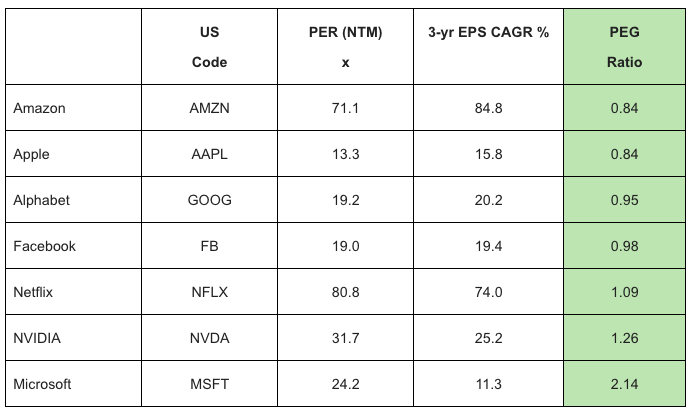FAANGs still looking sharp

Mason Stevens
The FAANG stocks (Facebook, Amazon, Apple, Netflix and Google/Alphabet) led the market up and participated in the recent correction. Their latest profit reports are an important guide to the sustainability of the tech sector's rise. Here we argue that on a Price Earnings Growth basis, they still look sharp.
The indications from Netflix, Alphabet, Facebook and Amazon (as well as Microsoft, Advanced Micro Devices and other tech companies) have been favourable.
The chart below shows the percentage share price gains of the FAANG stocks, as well as Microsoft and NVIDIA, since the start of the year. Netflix is up 62.4%, Amazon is up 34.5%, NVIDIA is up 17.0%, and Microsoft is up 12.0%. The share prices of Amazon and Microsoft touched intra-day record highs on Friday.
Apple, Alphabet and Facebook are still slightly lower than at the start of the year, although Facebook rallied strongly after its result, recovering some of the ground lost after its well-publicized privacy breach. Although Facebook remains 10% below its record set earlier this year, investor fears of users and customers deserting Facebook have so far proved unfounded.
The growth rates being achieved by these large tech companies are still phenomenal, in some cases accelerating as the company gets bigger (which is rare). Facebook's Q1 revenue rose 49% to US$11.97 billion, beating the consensus forecast of US$11.4 billion. The company now has 1.45 billion daily users. Net profit rose 62.5% year-on-year to US$4.99 billion. Earnings per share (EPS) was 25% higher than expected.
Alphabet recorded its strongest sales growth in 4 years. Revenue rose 25.8% year-on-year to US$31.15 billion in Q1. As usual, Google's advertising business accounted for most of the revenue, recording about 20% growth. Adjusted EPS rose by over 30% year-on-year.
Amazon's revenue rose 43% to US$51.0 billion in Q1, way above estimates. In recent years the growth rate has accelerated from 20% to 30% and now 40%+. Profit more than doubled.
Netflix recorded the strongest start to the year since listing 16 years ago. It added 7.41 million subscribers in Q1, with strong growth in Latin America and Europe (it added nearly 2 million subscribers in the US as well). It now has 125 million paying customers, more than any other online TV network. However, it still has negative free cash flow to the tune of US$287 million in Q1.
PEG ratios are attractive
One criticism often leveled at the tech stocks is that their valuations are too high, with a high PE ratio often cited as evidence. However, that needs to be balanced against the amount of earnings growth they are expected to generate.
The table below shows the consensus PE ratio on a next-twelve-months (NTM) basis and the expected 3-year forward EPS compound annual growth rate (CAGR) for the seven stocks mentioned above.
The PEG ratio divides the EPS CAGR into the PE ratio. The lower the number the better, with a number below 1.00 seen as attractive. The table ranks the stocks from the lowest to the highest PEG ratio.

Most of the stocks do not look expensive on this basis. Of course the earnings forecasts could prove to be overly optimistic. The competitive advantage of tech companies can be overtaken, sometimes quicker than in other sectors.
However, the latest batch of earnings numbers have caused analysts to revise up their forecasts, rather than the other way around.
Despite the risk of increasing regulation in certain areas (e.g. privacy, technology export controls, taxation, market dominance) the FAANGs still look sharp.
7 topics

Responsible for identifying domestic and international equity investment opportunities. 25 years of financial markets experience as an equity strategist, economist, analyst, portfolio manager and consultant.
Expertise

Responsible for identifying domestic and international equity investment opportunities. 25 years of financial markets experience as an equity strategist, economist, analyst, portfolio manager and consultant.
